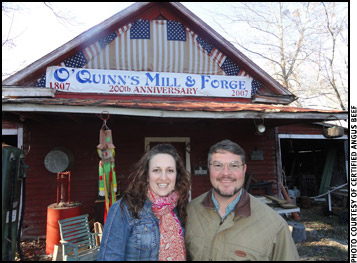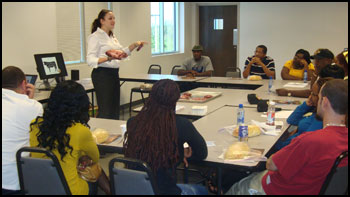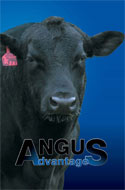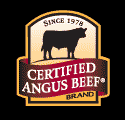CAB® 3QQ
3 quick questions with Maggie O’Quinn

Maggie and her husband, James, live on a 50-acre farm in rural Alabama and enjoy being “homebodies” when they get a break from hectic travel schedules.
Maggie O’Quinn was a dedicated 4-Her. She participated in cattle shows and on livestock judging teams with gusto. She was your typical Georgia “ag kid,” even graduating from her native state’s land-grant university with a major in ag communications. Three days later she boarded a plane for a six-month stint in Guatemala.
In those days, she never imagined she’d be living the life she is today. Since joining the Certified Angus Beef LLC (CAB) international team in fall 1997, O’Quinn has traveled to 40 different countries to develop — and in many cases break into — the market for the Certified Angus Beef® (CAB®) brand. O’Quinn also serves on the U.S. Meat Export Federation (USMEF) 2011 Executive Committee.
I chatted with her to see how her job as an executive account manager with primary focus on Latin America and the Caribbean differs from that of colleagues who serve in that role domestically.
How is marketing and promotion different outside the U.S. borders?
My job is very focused on true grassroots market development. Barbados is a beautiful example. I first went to Barbados in 1999. We launched that year, and it was an easy launch into very upscale hotels, resorts and restaurants; that was our only market at that time.

Maggie O’Quinn conducts a Fall 2010 sales trading seminar for Bahamas Food Services’ sales team in Nassau.
In 1999 there was no fresh U.S. beef in the market, period. Retail was so underdeveloped. Beef in Mr. and Mrs. Barbados Consumer’s mind was just stew meat. It didn’t matter if it was a tenderloin or a chuck roll, it was cubed up and frozen. I thought, “We’ll never launch our brand in Barbados at retail.” But fast-forward to 2006 and we launched CAB in a two-tier approach with USDA Select at the same time. Instead of just waltzing in and doing a traditional retail sale, we helped open the market for other fresh U.S. beef, which is such a big deal.
So a lot of our consumer education at retail is different than it is in the States. We’re teaching people the value of the word “fresh,” where here nobody is going to buy frozen unless they’re getting some fun Holten burgers for tailgating or something. That’s one example that’s very different. You’re helping truly change these markets as they evolve and grow.
Distributors are key to our success in every market, but how does our relationship with overseas partners carry even more weight?
I spend so much of my energy interviewing and selecting the right distribution companies in these new countries. I’ve helped get about 15 markets off the ground. It’s one of my favorite things to do, because we’re only as strong as our distribution partners in all these islands.
There are 40+ countries in the Caribbean. There is no way I’m going to make it to every country every year — it just doesn’t happen — so you need a strong partner who can really be your brand champion. I love that process of finding the right one. You want the established company with people who understand high-quality U.S. beef, who have experience importing high-quality proteins from the U.S. and, most importantly, above all else, somebody with a lot of integrity who can protect your brand.
The other fun component is getting to work with people at the export level. If we have strong exporters who are supporting us, that’s like having 15 extra Maggies running around the islands telling your story. I spend a lot of time on exporter education. They are on the road every week, and they can be huge champions and really move the needle in terms of our volume and our marketing.
From your international perspective, why do you encourage farmers and ranchers to keep their sights on marbling?
We have to constantly ask ourselves, “What is it that we're exporting? What is it that you want to be known for globally?” Today, our unique selling point against Brazil, India or China (and they’re all coming on strong, producing beef) is, loud and clear, that we’re about quality. It's so important that we stay focused on quality in everything we do, and it’s so important that we tell our story to the international customer. Why do we feed grain? Why does our product taste better in a sensory evaluation with all the world’s leading meat scientists?
 We’ve got to constantly work to stay ahead of these other countries because they’re nimble, they’re competitive and they want what we already have: our market share. I think we’ll stay ahead of them if we stay focused on quality.
We’ve got to constantly work to stay ahead of these other countries because they’re nimble, they’re competitive and they want what we already have: our market share. I think we’ll stay ahead of them if we stay focused on quality.












